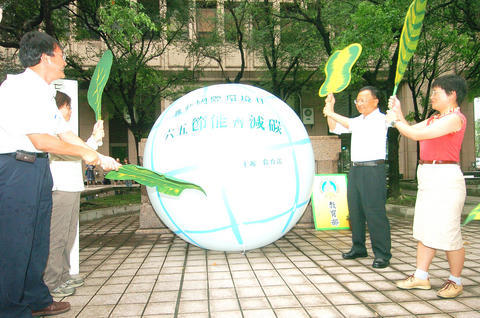The Ministry of Education is aiming for zero growth in school energy consumption this year amid the nation's soaring greenhouse gas emissions, Minister of Education Tu Cheng-sheng (杜正勝) said yesterday on the eve of World Environment Day.
A UN holiday promoting awareness of environmental issues, World Environment Day is typically an occasion used by government officials to address the nation's alarming carbon dioxide emission levels. In a press conference yesterday, Tu expressed concern for what he said was the yearly growth in energy consumption by schools nationwide, leading to further emissions of greenhouse gases.
He warned against cranking up air conditioners and called on students to wear cool, light attire as the summer approaches.

PHOTO: WANG MIN-WEI, TAIPEI TIMES
"If that which can be saved or cut down on isn't being saved or isn't being cut down on, you're being wasteful," Tu said.
The ministry plans to distribute energy saving and consumption monitoring technologies to more schools, it announced in a statement yesterday. Senior high schools and vocational schools nationwide, it said, were subsidized last year and in 2005 to install such technologies, leading to a "2 percent to 3 percent" reduction in consumption.
But the focus yesterday wasn't totally on Taiwan. Tu saved many of his remarks for China, which he slammed as "backward" for relying chiefly on coal for its energy needs. China's economic rise, he said, has led to an explosion in energy consumption there and, with that, "a daily worsening of pollution."
Environmental experts here, however, panned the government for "irresponsibility in its rampant increase of carbon dioxide emissions," saying that the nation's modest geographic size yet relatively high level of development make emissions levels inexcusable.
Unleashing more than 2.17 million tonnes of carbon dioxide into the atmosphere annually, or nearly 1 percent of the global total, Taiwan churns out more greenhouse gases than all but 21 nations, according to the Environmental Protection Administration.
"It's pretty bad," said Linda Arrigo of the Green Party Taiwan, a political party dedicated to protecting the environment, referring to the country's carbon dioxide emissions.
"Taiwan has doubled its carbon dioxide emissions since 1990, the year of the Kyoto Protocol, which aims to spur nations to gradually decrease such production," she said.
By more than doubling its greenhouse gas emissions from 1990 to 2005, according to official statistics, Taiwan's energy policies run counter to the spirit of the protocol, Arrigo said.
"It's outrageous," she said.
Speaking to the Taipei Times on condition of anonymity yesterday, a senior foreign trade official familiar with environmental issues here agreed, saying that "a negative de-coupling" in which the country's carbon dioxide emissions soar while its GDP drops, begs to be inverted.
But that's unlikely to happen in the near future because of the projected growth in carbon dioxide emissions, Arrigo said.
Steel and petrochemical plants scheduled to go online in Yunlin County, Arrigo said, would add approximately another 20 percent to the nation's greenhouse gas emissions.
"It's nice that schools want to decrease their energy consumption and carbon dioxide emission levels," she said. "But that's just a tiny fraction of the problem."

ANOTHER EMERGES: The CWA yesterday said this year’s fourth storm of the typhoon season had formed in the South China Sea, but was not expected to affect Taiwan Tropical Storm Gaemi has intensified slightly as it heads toward Taiwan, where it is expected to affect the country in the coming days, the Central Weather Administration (CWA) said yesterday. As of 8am yesterday, the 120km-radius storm was 800km southeast of Oluanpi (鵝鑾鼻), Taiwan’s southernmost tip, moving at 9kph northwest, the agency said. A sea warning for Gaemi could be issued tonight at the earliest, it said, adding that the storm is projected to be closest to Taiwan on Wednesday or Thursday. Gaemi’s potential effect on Taiwan remains unclear, as that would depend on its direction, radius and intensity, forecasters said. Former Weather Forecast

As COVID-19 cases in Japan have been increasing for 10 consecutive weeks, people should get vaccinated before visiting the nation, the Centers for Disease Control (CDC) said. The centers reported 773 hospitalizations and 124 deaths related to COVID-19 in Taiwan last week. CDC Epidemic Intelligence Center Director Guo Hung-wei (郭宏偉) on Tuesday said the number of weekly COVID-19 cases reported in Japan has been increasing since mid-May and surpassed 55,000 cases from July 8 to July 14. The average number of COVID-19 patients at Japan’s healthcare facilities that week was also 1.39 times that of the week before and KP.3 is the dominant

The Chinese Communist Party’s (CCP) working group for Taiwan-related policies is likely to be upgraded to a committee-level body, a report commissioned by the Mainland Affairs Council (MAC) said. As Chinese President Xi Jinping (習近平) is increasingly likely to upgrade the CCP’s Central Leading Group for Taiwan Affairs, Taiwanese authorities should prepare by researching Xi and the CCP, the report said. At the third plenary session of the 20th Central Committee of the CCP, which ended on Thursday last week, the party set a target of 2029 for the completion of some tasks, meaning that Xi is likely preparing to

US-CHINA TRADE DISPUTE: Despite Beijing’s offer of preferential treatment, the lure of China has dimmed as Taiwanese and international investors move out Japan and the US have become the favored destinations for Taiwanese graduates as China’s attraction has waned over the years, the Ministry of Labor said. According to the ministry’s latest income and employment advisory published this month, 3,215 Taiwanese university graduates from the class of 2020 went to Japan, surpassing for the first time the 2,881 graduates who went to China. A total of 2,300 graduates from the class of 2021 went to the US, compared with the 2,262 who went to China, the document showed. The trend continued for the class of 2023, of whom 1,460 went to Japan, 1,334 went to